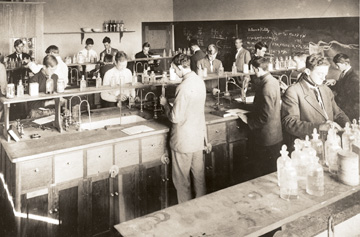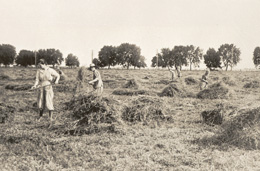Volume 25 · Number 1 · Fall 2007

Chemistry classes in the 1920s
Birthday Bash
Pins and banners on campus and around the region. Campus and community festivals. An equally impressive exhibit — in fact, the featured attraction at the California State Fair in 2008. And, for permanency, the Centennial Walk, an upgraded path through the Quad — the campus’s historic centerpiece where barley and alfalfa crops eventually gave way to shade trees and Picnic Day celebrations and countless students playing Frisbee between classes.
The walkway, the state fair exhibit, the festivals and many other events in 2008–09 will all pay tribute to UC Davis’ Centennial, marking the arrival of the university’s first students 100 years earlier.
UC Davis Celebrates a Century
The United States had its Founding Fathers, and UC Davis had its Founding Farmers. Not just any farmers, but men and women who knew something about biology, business, mechanics, animal husbandry, land stewardship, water, history, politics and community-building.
“At the University Farm in 1908, success in agriculture required a broad range of knowledge,” says Assistant Vice Chancellor Bob Segar, touting the interdisciplinary roots that blossomed into today’s UC Davis with its world-class programs in environmental sciences, engineering, management, the arts, law, viticulture and enology, life sciences and many more.
UC Davis has been nearly 100 years in the making, and now is the time to mark your calendars for the 2008–09 centennial, when the university will pay tribute to its past and look to the future.
Charlie Roddy, assistant vice chancellor for alumni relations, describes the centennial as “the ultimate homecoming,” and says the Cal Aggie Alumni Association is assembling an alumni leadership team for centennial participation.
The celebration will be for faculty and staff, too; for the city of Davis and the entire Sacramento region; for all of California; and for students, of course, including those who enroll in 2008–09.
The Centennial Class will number about 5,000, compared with the 109 men and women who attended the first courses in fall 1908 and arranged for room and board in town. The first residential class, in January 1909, numbered 18 — all men, because the North Hall dormitory had not been designed to accommodate women. (North Hall is still standing, now a home for a variety of student services; it’s next to South Hall, built in 1912 as a dorm and since converted also to house student services.)
With a charter faculty of 16 regular instructors from UC Berkeley’s College of Agriculture and 12 nonresident instructors, UC Davis launched a century of contributions to state, national and global agricultural progress.
But the Founding Farmers did so much more than work the land.
“Agriculture is the original interdisciplinary profession,” says Segar, the university’s chief centennial planner. The Founding Farmers meshed the sciences, looking for ways to improve social and economic conditions and environmental health. This interdisciplinary approach has survived as one of the university’s founding values for all Aggies past and present.
Another of UC Davis’ founding values is service to society. “We are a university with an unusual dedication to building strong communities and solving real-world problems,” Chancellor Larry Vanderhoef says. “Our first century, in fact, was built on that premise, and our next will surely continue to fulfill that promise.”

Female students in the summer of 1918.
UC Davis is well known for its contributions to the community through the UC Davis Health System and organizations such as Human Corps, a clearinghouse for student volunteer activities. “One of our centennial goals is to provide students, faculty, staff and alumni with increased opportunities to get involved in service projects,” says Segar.
But while the projects will be local, the centennial also will be a time to highlight UC Davis’ service to the state, nation and world — from battling West Nile virus and avian influenza, to improving California’s air quality and preserving Lake Tahoe’s water quality, to assessing and warning about the pollutants swirling around rescue workers at the World Trade Center, and fighting malaria in Africa.
“Now, more than ever, we’re solving problems that people care about, making a positive difference in people’s daily lives,” Segar says.
For more: centennial.ucdavis.edu
Dave Jones is associate editor of Dateline UC Davis.
